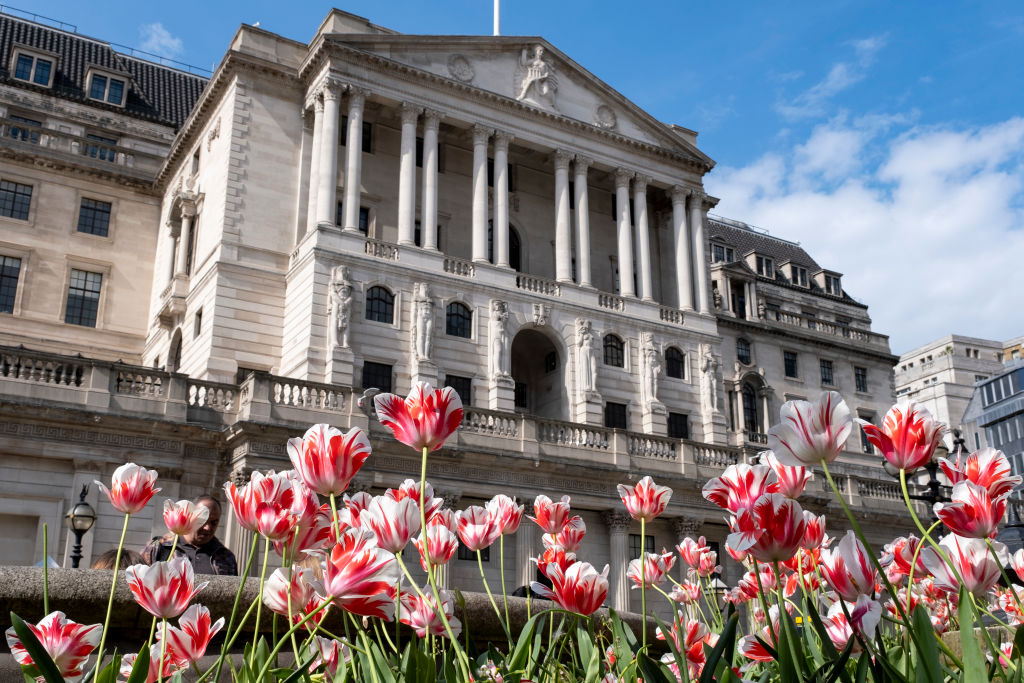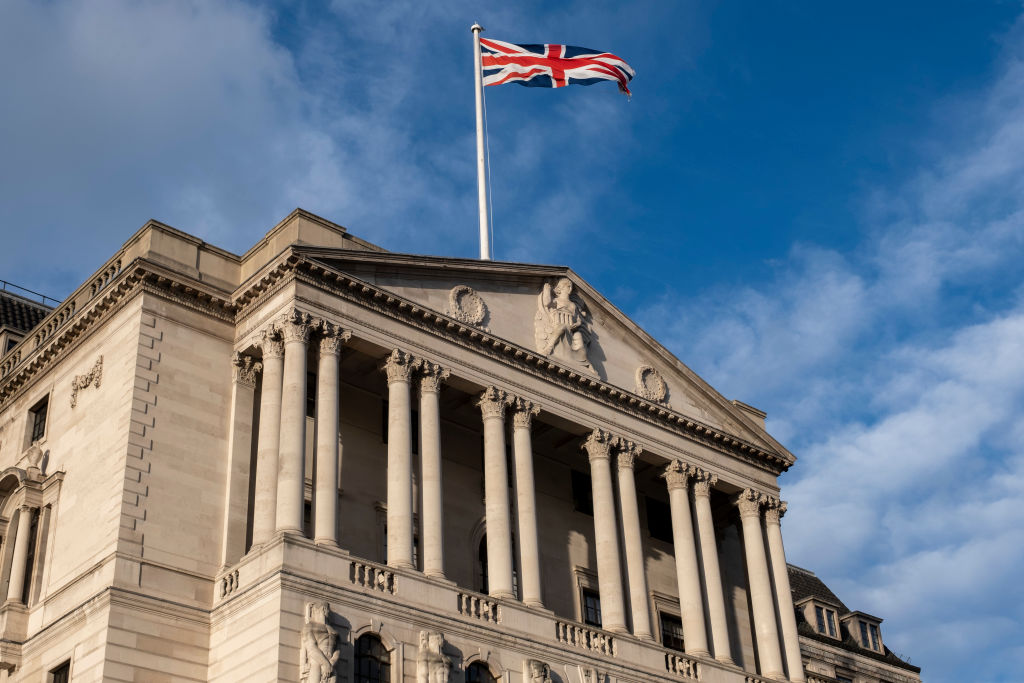UK to have highest inflation among advanced economies this year and next, says IMF
The International Monetary Fund (IMF) says it expects inflation to remain high in the UK, while lowering economic growth forecasts for 2026.


Get the latest financial news, insights and expert analysis from our award-winning MoneyWeek team, to help you understand what really matters when it comes to your finances.
You are now subscribed
Your newsletter sign-up was successful
Want to add more newsletters?

Twice daily
MoneyWeek
Get the latest financial news, insights and expert analysis from our award-winning MoneyWeek team, to help you understand what really matters when it comes to your finances.

Four times a week
Look After My Bills
Sign up to our free money-saving newsletter, filled with the latest news and expert advice to help you find the best tips and deals for managing your bills. Start saving today!
Inflation in Britain is forecast to be the highest among all advanced economies in 2025 and 2026, according to new predictions by the International Monetary Fund (IMF), in a pre-Budget blow to chancellor Rachel Reeves.
Price growth in the UK is now predicted to have averaged 3.4% in 2025, up 20 basis points from the IMF’s July prediction of 3.2%, making it the highest among all advanced economies, says the World Economic Outlook report.
The predicted high average annual inflation rate will be no surprise to those who have followed the trajectory of CPI this year. It stood at 3% in January and was recorded at 3.8% in August.
MoneyWeek
Subscribe to MoneyWeek today and get your first six magazine issues absolutely FREE

Sign up to Money Morning
Don't miss the latest investment and personal finances news, market analysis, plus money-saving tips with our free twice-daily newsletter
Don't miss the latest investment and personal finances news, market analysis, plus money-saving tips with our free twice-daily newsletter
The official figures for September are yet to be published, but the Bank of England expects inflation to have peaked at 4% last month.
The IMF says the rise in headline inflation in the UK in 2025 is partly due to the changes in regulated prices (those controlled by the government), many of which increased in ‘Awful April’.
The pain is set to continue into next year too as inflation is expected to average 2.5% in 2026, another 20 basis points higher than the IMF’s previous prediction (2.3%).
Thankfully, inflation is expected to fall much closer back towards the Bank of England’s 2% target by the end of 2026, which the IMF says will be helped by “a loosening labour market and moderating wage growth”.
The IMF’s prediction of inflation falling in 2026 is one shared by most inflation forecasters, including the Bank of England.
Meanwhile, the UK is also expected to endure the highest long-term borrowing costs of any major economy, putting further pressure on Reeves as she attempts to balance the books before her Autumn Budget.
2025 growth forecast is the silver lining
One area that the UK did lead in was economic growth, which is expected to average 1.3% in 2025, 20 basis points higher than the IMF’s previous forecast (1.1%), making it the second-fastest growing major economy after the United States.
However, economic growth forecasts have been downgraded for 2026 as UK GDP growth is expected to remain at 1.3%, down from the 1.4% predicted in July.
Chancellor Rachel Reeves welcomed the upwards growth revision for 2025, saying: “This is the second consecutive upgrade to this year's growth forecast from the IMF. It’s no surprise, Britain led the G7 in growth in the first half of this year, and average disposable income is up £800 since the election.
“But know this is just the start. For too many people, our economy feels stuck. Working people feel it every day, experts talk about it, and I am going to deal with it. Working together, we can deliver a Britain built for all.”
IMF report ‘grim reading’ ahead of the Budget
In contrast to Reeves’s upbeat response, Conservative shadow chancellor Mel Stride said: “The IMF assessment makes for grim reading. Inflation in the UK is now set to be the highest in the G7 this year and next – rising faster than expected because of the choices Rachel Reeves has made.
“Since taking office, Labour have allowed the cost of living to rise, debt to balloon, and business confidence to collapse to record lows. Taxes are rising to record highs, and families are being squeezed from all sides. Labour should be getting spending under control to bring down borrowing and avoid damaging tax rises, but Starmer and Reeves are simply too weak to do it.”
It’s not just Reeves’s political opponents who saw more bad than good in the IMF’s report.
Lindsay James, investment strategist at Quilter, said: “Despite the small uptick in growth forecasts from the IMF, today’s report is not welcome reading for the Treasury ahead of what is a crucial Budget in just over a month’s time.
“This should be a shot across the bows for Rachel Reeves. The next Budget must not push yet more costs onto businesses at a time when inflation risks becoming more embedded; it ultimately ends up being shouldered largely by consumers, the very ‘working people’ she has said she wants to protect.
“She will need to come to the despatch box with genuinely pro-growth policies or face the reality that spending will need to be reined in to ease the nation’s debt burden. It is an unenviable position given neither are particularly easy to achieve.”
Get the latest financial news, insights and expert analysis from our award-winning MoneyWeek team, to help you understand what really matters when it comes to your finances.

Daniel is a financial journalist at MoneyWeek, writing about personal finance, economics, property, politics, and investing.
He covers savings, political news and enjoys translating economic data into simple English, and explaining what it means for your wallet.
Daniel joined MoneyWeek in January 2025. He previously worked at The Economist in their Audience team and read history at Emmanuel College, Cambridge, specialising in the history of political thought.
In his free time, he likes reading, walking around Hampstead Heath, and cooking overambitious meals.
-
 Should you buy an active ETF?
Should you buy an active ETF?ETFs are often mischaracterised as passive products, but they can be a convenient way to add active management to your portfolio
-
 Power up your pension before 5 April – easy ways to save before the tax year end
Power up your pension before 5 April – easy ways to save before the tax year endWith the end of the tax year looming, pension savers currently have a window to review and maximise what’s going into their retirement funds – we look at how
-
 Why Scotland's proposed government bonds are a terrible investment
Why Scotland's proposed government bonds are a terrible investmentOpinion Politicians in Scotland pushing for “kilts” think it will strengthen the case for independence and boost financial credibility. It's more likely to backfire
-
 How have central banks evolved in the last century – and are they still fit for purpose?
How have central banks evolved in the last century – and are they still fit for purpose?The rise to power and dominance of the central banks has been a key theme in MoneyWeek in its 25 years. Has their rule been benign?
-
 Is Britain heading for a big debt crisis?
Is Britain heading for a big debt crisis?Opinion Things are not yet as bad as some reports have claimed. But they sure aren’t rosy either, says Julian Jessop
-
 'Britain is on the road to nowhere under Labour'
'Britain is on the road to nowhere under Labour'Opinion Britain's economy will shake off its torpor and grow robustly, but not under Keir Starmer's leadership, says Max King
-
 'Governments are launching an assault on the independence of central banks'
'Governments are launching an assault on the independence of central banks'Opinion Say goodbye to the era of central bank orthodoxy and hello to the new era of central bank dependency, says Jeremy McKeown
-
 Why investors can no longer trust traditional statistical indicators
Why investors can no longer trust traditional statistical indicatorsOpinion The statistical indicators and data investors have relied on for decades are no longer fit for purpose. It's time to move on, says Helen Thomas
-
 Live: Bank of England holds UK interest rates at 4.5%
Live: Bank of England holds UK interest rates at 4.5%The Bank of England voted to hold UK interest rates at their current level of 4.5% in March, as widely anticipated, after inflation rose to 3% in January
-
 Bank of England cuts interest rates to 4.5%: full updates and analysis
Bank of England cuts interest rates to 4.5%: full updates and analysisThe Bank of England voted to reduce the base rate by 25 basis points at the first MPC meeting of the year on 6 February. Full coverage as it happened from the team at MoneyWeek.